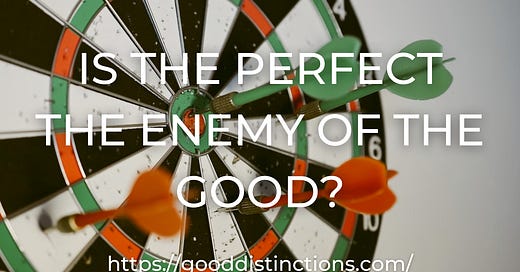NOTE: THIS EPISODE WAS PUBLISHED BEFORE OUR REBOOT. willwrightcatholic.com is now gooddistinctions.com
The Perfect As the Enemy of the Good
The French philosopher Voltaire famously quipped "Le mieux est l'ennemi du bien" which means "the perfect is the enemy of the good."
It would seem that the great American author John Steinbeck agrees. He wrote: "And now that you don't have to be perfect, you can be good." Confucius is attributed with something similar: "Better a diamond with a flaw than a pebble without." And Shakespeare wrote in King Lear: "Striving to better, oft we mar what's well." George Orwell more recently wrote: "The essence of being human is that one does not seek perfection."
Be Perfect As Your Heavenly Father is Perfect
The greatest human being to ever live is a Divine Person named Jesus called Christ. He said, "You therefore must be perfect, as your heavenly Father is perfect (Mt. 5:48)." So, is the perfect the enemy of the good? Or is perfection the goal?
Interestingly, this passage follows directly after the Christian call to love one's enemies. All cultures say that we must love our neighbor, even as ourself. The Golden Rule is shared by most every culture. However, the call to love even your enemy is impossible. That is, it is impossible without the Divine, who is perfect.
Can, then, the call to perfection be reconciled with the seemingly ubiquitous notion that the perfect is the enemy of the good? Absolutely! The key is in the view of perfection which Jesus gives us.
Christ does not ask us to be perfect on our own accord. He asks us to be perfect as our Heavenly Father is perfect. It is precisely by participation with the Divine that we can hope to be perfect. And apart from Him we have no hope. Rooted in the humility of knowing that we are not God, we can begin to grow in self-knowledge. This self-knowledge then leads to personal improvement, if we cooperate with grace.
If you are not a believer, then perhaps what I am saying makes no sense. But, let me put it this way.
You and I are not perfect. If you have any sense of self, you know this is true. In your mind, using your power of abstraction, try to hold in your mind not something that is good or better, but the absolute best. This sheer perfection, the best, is God for whatever quality we are speaking of. This is too simplistic because God is personal, but this might help you contextualize.
So, if God is the absolute best in the virtue in which you are trying to improve, then He is also the goal. And not only that, if He is the Creator and sustainer of all things, then He is the One who moves an act to its completion. To be perfect is to be with He who is perfect, every step of the way. This means that the important thing is not our perfection at any moment, but our striving. By aiming correctly at the goal, and cooperating with the perfect good, then we are on the right track. I would argue that this means more to people, innately, than even achieving a goal. We are more compelled by a hero suffering willingly to overcome an obstacle than we are to even see the hero win.
What is Meant By "The Perfect is the Enemy of the Good"?
The enemy of the Good is not the perfect. For the Perfect One is the Good itself. What is the enemy of the good is perfectionism. Perfectionism is a form of pelagianism, an ancient heresy in which one is to pull themselves up by their spiritual bootstraps and will to be better. Simply by trying harder, the perfectionist believes that they can attain perfection.
Certainly, the perfect ideal must always be taken into account, because it gives us our goal, our terminus, our design. If we do not measure up to this perfection, then we have a few courses of action. We can discern that the path that we are pursuing is not the right one. We can continue to "try, try again." We can despair. We can resolutely continue to strive. With all the many courses of action, how can we know what to do?
We can be sure that we are on the right course only if we are sure of what we are aiming at. In the absence of a target, an arrow flying through the air would only be a hazard. If we are certain that our target is worthwhile, then despair is not an option and quitting is not an option. If the target is worthwhile, then continued striving is the proper course.
Being With the Perfect Rather Than Being the Perfect
Remember, that to be perfect is to be WITH the perfect rather than BEING the perfect. As we seek a goal, no matter how big or small, we need to ensure that it is well ordered to the highest good, who alone is perfect. We should not ask: "what do I want?" Because we will often get the wrong answer. Instead, we should ask "what does God want for me?"
If the notion of God makes you uncomfortable, then ask this subordinate question: "Where does the wisdom of the ages tell me that I should aim?" Human nature does not change and the societies and cultures over many millennia bear with them a great deal of wisdom for us to harvest.
To be with the perfect is to allow ourselves to be given wisdom, accept it, and apply it. Those who attempt to make their own perfection inevitably choose wrongly. The perfect is the enemy of the good, when the perfection comes from within us.
Just Do It
The U.K. author Paul Arden, in his book It's Not How Good You Are, It's How Good You Want to Be writes,
"Too many people spend too much time trying to perfect something before they actually do it. Instead of waiting for perfection, run with what you got, and fix it along the way."
I am certainly not endorsing doing something dangerous without a plan, but there is a lot of truth to what Mr. Arden has written.
This really gets to the heart of what most people mean when they say that "the perfect is the enemy of the good." They mean that an idea can die in committee before it ever gets put into practice. A project might continue to percolate until all of the passion is completely gone from it.
By following in the venerable traditions which came before, we give ourselves valuable guardrails. Morality is objective and the convictions of what has always been true protect us from erring egregiously as we press forward towards the good and perfect. Without these guardrails, we will fall headlong off a cliff of moral relativism and subjective narcissism.
The balance gives us this: we must move forward and act. We cannot be paralyzed by fear and a desire for everything to be perfect before it is actualized. But we must constantly refocus our aim at the highest good. For the Christian, this is where prayer comes in. For those of other faiths and even agnostics, this could be called meditation.
By refocusing our aim and working hard, in humility, we can have hope that we will come to the fullness of perfection. Rest assured, that if you get there one day, it will not be because of your own solo merit; it will be because of your cooperation with the highest good.














Share this post